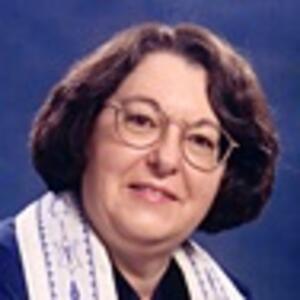Sally Priesand ordained as first American woman rabbi
Sally Priesand made history on June 3, 1972, when she was ordained by Hebrew Union College-Jewish Institute of Religion (HUC-JIR), becoming the first female rabbi in American history and the first woman to be ordained by a rabbinical seminary.
Priesand, who grew up in Cleveland, was the first of a number of women who had studied at Hebrew Union College to make her way all the way to ordination. She continued in the rabbinical program after completing the joint undergraduate degree offered by HUC-JIR with the University of Cincinnati, receiving important support along the way from the HUC-JIR president, Nelson Glueck.
Priesand faced both opposition and derision during her training. Initially, many of her classmates and teachers believed that her quest for ordination was only a "passing fancy" and that she was really in rabbinical school in search of a husband. Later, some congregations refused to accept her as a student rabbi in their pulpits. The Dean of the College worried publicly about how Priesand would fulfill her rabbinic duties while raising children. Ironically, perhaps, Priesand eventually decided that to fill her chosen role effectively, she would not be able to raise a family of her own.
Priesand proved her doubters wrong. Upon graduation, she secured a post as assistant rabbi at the Stephen Wise Free Synagogue in Manhattan, considered one of the premier reform synagogues in the country, with some 750 families. She served that congregation, as assistant and associate rabbi, for seven years.
In 1979, however, Priesand left Stephen Wise when she realized that she would not be chosen to succeed the ailing senior rabbi. It was a disappointment for Priesand, who had always believed that her "ability, sincerity, and dedication" would outweigh her gender if she did a competent job. She told the New York Times that she had learned that "competence and commitment are enough for a man, but not for a woman." In the wake of her departure from Stephen Wise, Priesand began to speak more publicly about the need for the Reform movement to more actively support women in the rabbinate.
Despite her symbolic role as the first woman rabbi, Priesand did not start on the rabbinical path as an outspoken advocate of women's issues. As a rabbinical student, she said that although she thought the feminist movement was "important," she was "not an active supporter of women's lib." However, she did write her rabbinical thesis on women's roles within Judaism, and, beginning in 1979, she actively pushed the Reform movement to supplement its spoken support of female rabbis with actions that would further their acceptance by congregations. In particular, she advocated for the hiring of female faculty at HUC-JIR, and the addition of women to the movement's various governing boards.
Priesand served as the part-time rabbi of Temple Beth El in Elizabeth, NJ, and as a chaplain at Manhattan's Lenox Hill Hospital from 1979 to 1981. In 1981, she became the rabbi at Monmouth Reform Temple in Tinton Falls, NJ, where she nurtured the kind of community that, as a student, she had hoped a congregation could become. Priesand is recognized and admired as a pioneering figure in world Jewry. The Rabbi Sally J. Priesand Visiting Professorship of Jewish Women's Studies was created in her honor to support a visiting professor every year on one of the campuses of HUC-JIR. Priesand has also been active within the larger Reform movement, serving on the executive boards of the Central Conference of American Rabbis, the Union of American Hebrew Congregations, the Rabbinic Alumni Association, and the Board of Governors of Hebrew Union College-Jewish Institute of Religion.
Rabbi Priesand retired from Monmouth Reform Temple on June 30, 2006 after 25 years of service to that congregation.
Sources: Jewish Women in America: An Historical Encyclopedia, pp. 1102-1104; www.spoke.com/info/p6r6rli/RabbiPriesand; New York Times, October 31, 1970; November 22, 1970; April 13, 1971; December 9, 1979; Pamela Nadell, Women Who Would Be Rabbis: A History of Women's Ordination, 1889-1985 (Boston, 1998); www.forward.com/articles/418/.




Rabbi Priesand presided over my Bat Mitzvah ceremony in May of 1973! I did not realize at the time the significance of having a female rabbi.
I have had the pleasure of meeting Rabbi Priesand, at the Jewish Heritage Museum of Monmouth County, where I serve, in a volunteer capacity, as their IT Technical Consultant, and where she was one of the founders of the Museum and served on the Board of Trustees. She contributed to the museum, tremendously, with her sage advice, and was a voice of reason, at the sometimes very long and trying Board of Trustee Meetings. I had not had the pleasure of knowing her in her role as a spiritual leader, but was honored to get to know her, even for just a short time. She is a wonderful, caring, individual, and very obviously dedicated to the Jewish Community of Monmouth County.
On this anniversary of her ordination as the first woman Rabbi, I applaud her for her accomplishments, and send best wishes from a friend from the Museum.
Batsheva (Shevi) Salberg, PhD
Rabbi Priesand is a perfect example of how living a Jewish life--with humility, total devotion to others (Jews and Gentiles), and passion for social justice--sets an example, without fanfare, that will change, indeed already has changed, the world.
Happy Anniversary Sally and thank you for opening the door to let the rest of us flood through!
Rabbi Paula Jayne Winnig
Ordained 1986